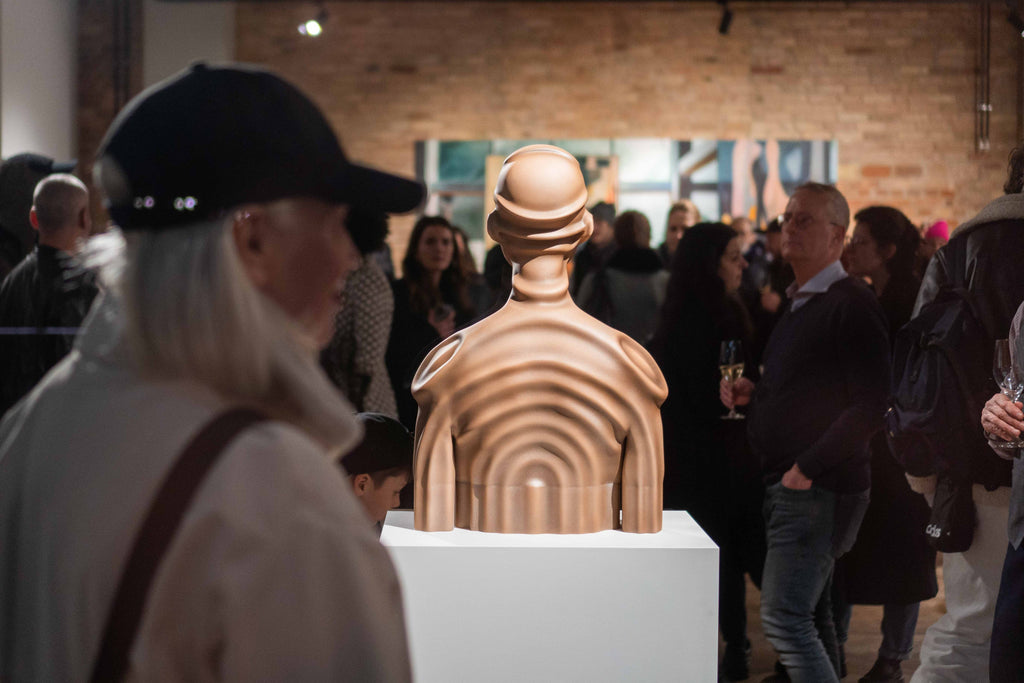AMIR FATTAL
POST-ARTIFICIAL PAINTINGS
KÖNIG TELEGRAPHENAMT
15 FEBRUARY – 16 MARCH 2024
PUBLIC OPENING
14 FEBRUARY 2024 | 6–8 PM
KÖNIG TELEGRAPHENAMT is pleased to present POST-ARTIFICIAL PAINTINGS, a solo exhibition by Amir Fattal, born in Tel Aviv in 1978 and based in Berlin since 2002. Fattal stands at the forefront of blending generative artificial intelligence with traditional art forms.
POST-ARTIFICIAL PAINTINGS is one of the first painting exhibitions globally to not only use generative AI technology as a tool, but to introspectively examine the technology itself and its impact on the art world and society at large. Fattal says: "It is the artist's responsibility to reflect on this technology, the most significant creative revolution in human history, encompassing the collective creativity of all humanity."
Exhibition opening at KÖNIG TELEGRAPHENAMT © Image KÖNIG GALERIE
Fattal begins each of his works with a series of keywords and prompts that coax a fictional portrait out of the depths of the "collective unconscious" of artificial intelligence. The subjects are various protagonists of an idealized "art world" – from artists with models in their studios to collectors in their homes to art dealers in their offices. They all pose with one of their most prized possessions: an "artwork within an artwork". This second artwork is also the product of AI, generated according to the specific aesthetics and values of each protagonist depicted.
Exhibition opening at KÖNIG TELEGRAPHENAMT © Image KÖNIG GALERIE
The figures in Fattal's paintings embody the ideals of the present, placeholders for wealth, style, elegance, sophistication, and artistic sensibility. Displaying an impeccable taste for designer garments and existing among their carefully arranged furniture and displaying expressions of unfettered self-confidence, Fattal’s protagonists are almost too perfect to be true. They are both a product and a commentary on our society, a mirror reflecting the various ways our collective data is harnessed to dream up new realities. The style of the painting nods to hyperrealism, each detail articulated with a brushstroke that seems at odds with the cold precision of its original digital blueprint. Fattal’s oil paintings, executed by hand via a dedicated painting workshop in China, not only revisit the age-old practice of art reproduction but also engage in a nuanced commentary on globalization, the commodification of art, and the broader implications of AI in our capitalist society.
Exhibition opening at KÖNIG TELEGRAPHENAMT © Image KÖNIG GALERIE
Moreover, POST-ARTIFICIAL PAINTINGS introduces three works of his series LOVE CHILD. Fattal used a technology originally developed for forensic science in which a person's facial features can be reconstructed based on data extracted from raw DNA. Fattal goes one step further, though, by combining the DNA of six of his closest friends to create composite facial realizations of how their potential offspring might look. The DNA visualized using the 3D printer is ultimately a combination of the two test subjects in bust form, with their surfaces finished by hand, giving the generated figures a futuristic, yet somehow individualized look.
Exhibition opening at KÖNIG TELEGRAPHENAMT © Image KÖNIG GALERIE
Amir Fattal bridges the realms of generative AI and traditional art in a manner that not only showcases the aesthetic and creative possibilities of this fusion but also prompts a reflection on the implications of such technology in shaping our societal and artistic landscapes. Ultimately, POST-ARTIFICIAL PAINTINGS seeks to illuminate the potential for artificial intelligence to not only complement but profoundly transform the creative process, offering a glimpse into a future where technology and human creativity coalesce to redefine the boundaries of art.








